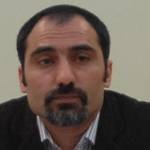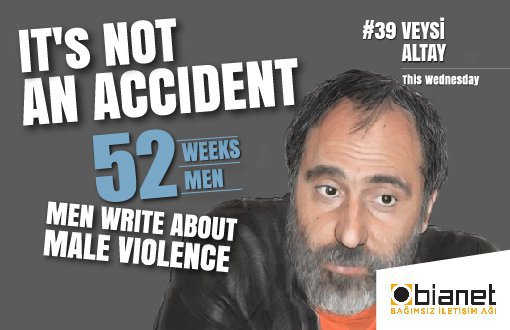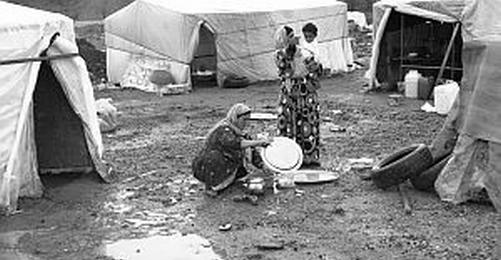Click to read the article in Turkish / Kurdish
I am writing as a man who feels responsible for stopping male violence and aims to eradicate it starting with the violence in his own life, rather than a man who attempts to give advice to women on how to struggle against male violence.
Even though I don't believe that men participating in discussions about gender and male violence will make an extra contribution to what women already say on the solution of this problem, I will try to write about my efforts on this path and my deficiencies.
Starting from their childhood, men and colonialists are taught and trained to think that they are privileged, and they want to use this throughout their lives. Knowingly or not, I also used this privilege.
It took me a long time to comprehend the concept of gender that points at the roles and responsibilities that the society ascribes on men and women, apart from their biological sexes.
Because I grew up with the idea that violence is considered normal and even necessary when required. It took me a long time to realize that a woman who is successful or objects to something is called "a manly woman", which praises not her but masculinity, or that when a strong woman is referred to as "a stately woman", it underlines the "greatness of the state".
Especially in the course of many studies I conducted later, I clearly saw that women are actually in the front lines and none of them are like "the state" or "man".
In the documentary I made about the women in Cizre, I learned by being ashamed of my manhood and myself—as Marx says, shame is a virtue—that no woman is like "the state" or "man" in the face of state and male violence, that they are completely and precisely "woman" and are strong and tenacious as women.
I questioned my masculinity a lot while bearing witness to three or four years of Mother Berfo's struggle of searching for her forcibly disappeared son, a search that lasted 33 years until she passed away at the age of 105 unable to find her son's remains.
In the same manner, I closely witnessed how Asiye Doğan and Hediye Coşkun, both of whose 13-year-old sons were detained and forcibly disappeared in 1995 (Coşkun's husband was also killed by the state in front of her eyes in 1993), struggled "for men" against the power of the state as "women".
Of course, my most important confrontation happened thanks to the Kurdish Women's Movement. The struggle of the Kurdish Women's Movement against the male mindset within the "Movement", their quest for identity as women and their self-sacrifice, which I only understood much later, trained me and trained us with patience.
Of course this patience and questioning yourself in this training process or not being able to do justice to the time and energy spent on training you leaves many deficiencies in a person.
Just like the relationship between the colonialist and the colony. Colonialists do not question themselves, they do not judge themselves, they do not want to find faults with themselves.
It predicates itself on assimilating the other to oneself instead of changing itself with the self-confidence arising from its dominant status. When there are protests, it tries to find different arguments to justify itself instead of changing. As is the case in the relationship between Turks and Kurds and men and women.
If I turn to myself, I would like to emphasize an incident, which brought about my biggest transformation and caused me to hate myself as a man.
This incident is the "exhibition" of the naked body of Kader Kevser Eltürk (Ekin Van) in the middle of Varto, Muş on August 10, 2015 by the male law enforcement officers of the state, most of whom with blood on their hands and proud of this blood, with the aim of humiliating her in their own way. In fact, if we look back, what happened in Varto was a concrete indicator of what they meant when they said "a stately woman", "a manly woman".
Because, in their minds, woman is the "honor" of the man and of the society, and with this act they aimed to defile the "honor" of the Kurdish people.
However, there was something they did not know: That naked body would become the honor and pride of the women who were struggling for years and of us men, who have partly managed to change themselves.
Moreover, working together and being friends with the women who have a feminist consciousness and protect their rights till the bitter end was informative and led me to question myself in that period.
Because, there was a big difference between understanding an issue in theory and implementing it in practical life. In other words, understanding that the things I view as my rights actually originate from my gender training did not automatically lead me to give up on those rights.
Because, giving up on the rights that patriarchy bestows upon men is not that easy. Being constantly questioned and corrected by feminist women has increased my efforts to this end.
Today, I am paying scrupulous attention to refrain from using a masculine language or behaving in ways that can be perceived as psychological, economic, verbal or physical violence; but, it would still be presumptuous to say that I am able to look at the male violence around me from the right perspective.
At times, I still turn to "but"s. For instance, when a relative or friend of mine verbally abuses his woman partner, I sometimes catch myself thinking, "but, at least, there is no physical violence."
It is not easy to be done with coming to terms with manhood. Since the things that we think we have accumulated can disappear very fast, it is impossible to say, "I have overcome it". It is a reality that needs to be confronted continually, over and over again.
In order to prevent the violence that we claim to take a stand against, we men must first confront our own violence. The process of questioning "manhood" starts precisely at this point.
With the awareness that we cannot remain outside it merely by saying "I am outside it", we need to sincerely open ourselves to the objections raised by women and learn to listen to the discourses of feminists.
We have no choice but to find the ways of distancing ourselves from and struggling against manhood. (VA/ŞA/APA/SD/TK/IG)
* Images: Kemal Gökhan Gürses






